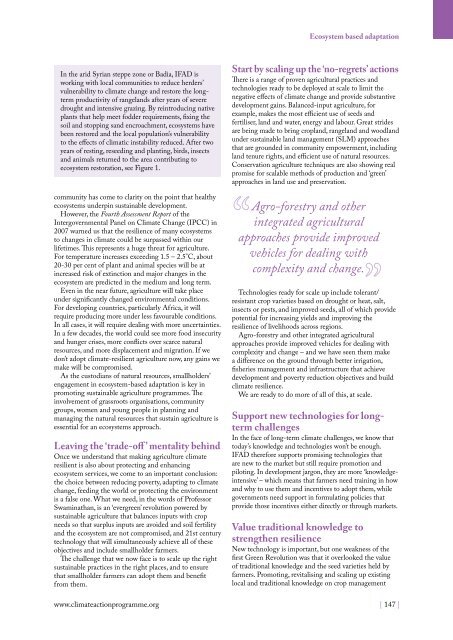Climate Action 2010-2011
Create successful ePaper yourself
Turn your PDF publications into a flip-book with our unique Google optimized e-Paper software.
Ecosystem based adaptation<br />
In the arid Syrian steppe zone or Badia, IFAD is<br />
working with local communities to reduce herders’<br />
vulnerability to climate change and restore the longterm<br />
productivity of rangelands after years of severe<br />
drought and intensive grazing. By reintroducing native<br />
plants that help meet fodder requirements, fixing the<br />
soil and stopping sand encroachment, ecosystems have<br />
been restored and the local population’s vulnerability<br />
to the effects of climatic instability reduced. After two<br />
years of resting, reseeding and planting, birds, insects<br />
and animals returned to the area contributing to<br />
ecosystem restoration, see Figure 1.<br />
community has come to clarity on the point that healthy<br />
ecosystems underpin sustainable development.<br />
However, the Fourth Assessment Report of the<br />
Intergovernmental Panel on <strong>Climate</strong> Change (IPCC) in<br />
2007 warned us that the resilience of many ecosystems<br />
to changes in climate could be surpassed within our<br />
lifetimes. This represents a huge threat for agriculture.<br />
For temperature increases exceeding 1.5 – 2.5°C, about<br />
20-30 per cent of plant and animal species will be at<br />
increased risk of extinction and major changes in the<br />
ecosystem are predicted in the medium and long term.<br />
Even in the near future, agriculture will take place<br />
under significantly changed environmental conditions.<br />
For developing countries, particularly Africa, it will<br />
require producing more under less favourable conditions.<br />
In all cases, it will require dealing with more uncertainties.<br />
In a few decades, the world could see more food insecurity<br />
and hunger crises, more conflicts over scarce natural<br />
resources, and more displacement and migration. If we<br />
don’t adopt climate-resilient agriculture now, any gains we<br />
make will be compromised.<br />
As the custodians of natural resources, smallholders’<br />
engagement in ecosystem-based adaptation is key in<br />
promoting sustainable agriculture programmes. The<br />
involvement of grassroots organisations, community<br />
groups, women and young people in planning and<br />
managing the natural resources that sustain agriculture is<br />
essential for an ecosystems approach.<br />
Leaving the ‘trade-off ’ mentality behind<br />
Once we understand that making agriculture climate<br />
resilient is also about protecting and enhancing<br />
ecosystem services, we come to an important conclusion:<br />
the choice between reducing poverty, adapting to climate<br />
change, feeding the world or protecting the environment<br />
is a false one. What we need, in the words of Professor<br />
Swaminathan, is an ‘evergreen’ revolution powered by<br />
sustainable agriculture that balances inputs with crop<br />
needs so that surplus inputs are avoided and soil fertility<br />
and the ecosystem are not compromised, and 21st century<br />
technology that will simultaneously achieve all of these<br />
objectives and include smallholder farmers.<br />
The challenge that we now face is to scale up the right<br />
sustainable practices in the right places, and to ensure<br />
that smallholder farmers can adopt them and benefit<br />
from them.<br />
Start by scaling up the ‘no-regrets’ actions<br />
There is a range of proven agricultural practices and<br />
technologies ready to be deployed at scale to limit the<br />
negative effects of climate change and provide substantive<br />
development gains. Balanced-input agriculture, for<br />
example, makes the most efficient use of seeds and<br />
fertiliser, land and water, energy and labour. Great strides<br />
are being made to bring cropland, rangeland and woodland<br />
under sustainable land management (SLM) approaches<br />
that are grounded in community empowerment, including<br />
land tenure rights, and efficient use of natural resources.<br />
Conservation agriculture techniques are also showing real<br />
promise for scalable methods of production and ‘green’<br />
approaches in land use and preservation.<br />
Agro-forestry and other<br />
integrated agricultural<br />
approaches provide improved<br />
vehicles for dealing with<br />
complexity and change.<br />
Technologies ready for scale up include tolerant/<br />
resistant crop varieties based on drought or heat, salt,<br />
insects or pests, and improved seeds, all of which provide<br />
potential for increasing yields and improving the<br />
resilience of livelihoods across regions.<br />
Agro-forestry and other integrated agricultural<br />
approaches provide improved vehicles for dealing with<br />
complexity and change – and we have seen them make<br />
a difference on the ground through better irrigation,<br />
fisheries management and infrastructure that achieve<br />
development and poverty reduction objectives and build<br />
climate resilience.<br />
We are ready to do more of all of this, at scale.<br />
Support new technologies for longterm<br />
challenges<br />
In the face of long-term climate challenges, we know that<br />
today’s knowledge and technologies won’t be enough.<br />
IFAD therefore supports promising technologies that<br />
are new to the market but still require promotion and<br />
piloting. In development jargon, they are more ‘knowledgeintensive’<br />
– which means that farmers need training in how<br />
and why to use them and incentives to adopt them, while<br />
governments need support in formulating policies that<br />
provide those incentives either directly or through markets.<br />
Value traditional knowledge to<br />
strengthen resilience<br />
New technology is important, but one weakness of the<br />
first Green Revolution was that it overlooked the value<br />
of traditional knowledge and the seed varieties held by<br />
farmers. Promoting, revitalising and scaling up existing<br />
local and traditional knowledge on crop management<br />
www.climateactionprogramme.org | 147 |












